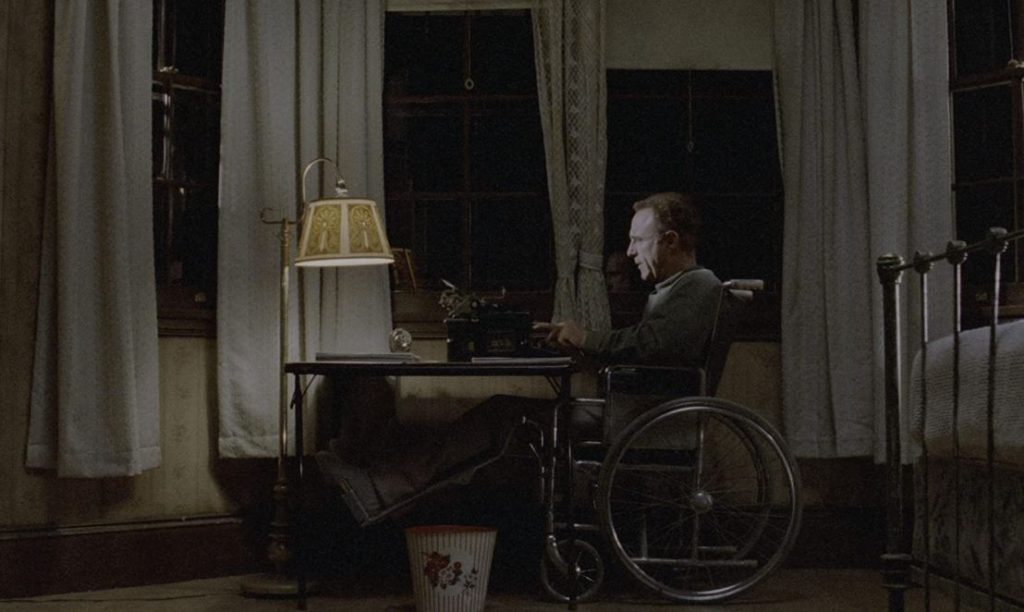Caan did much better than a lot of actors, but his lengthy career still manages to give off a whiff of disappointment. There was never any doubt about his ability, typified by an early performance as a brain-damaged ex-ball player in 1969’s The Rain People. Here he’s very good at doing what he can with Coppola’s meandering script, but such a decent start was a blip next to his iconic turn as a big-dicked, meathead Mafioso in The Godfather.
He spent the next half a century trying to escape Sonny Corleone’s endless shadow, having a go at everything from a corrupt cop to a WW2 soldier with varying degrees of success, while watching his co-stars Pacino, Duvall et al go from strength to strength. He did well in uncompromising stuff such as The Gambler and Thief, but too many films (Rollerball, Alien Nation) fell short, a fair few (The Killer Elite, Harry and Walter Go to New York, The Way of the Gun, Elf) were dire and some were just an extraordinary, buddy-cop prototype mess like Freebie and the Bean. Finally, though, he nailed a worthy post-Godfather role with Misery, one of the better adaptations of Stephen King’s work.

He plays Paul Sheldon, a successful novelist who has just completed his latest work at a hideaway. With the manuscript safely tucked into a leather satchel, he attempts to return to his New York home only to run off an isolated road during a blizzard. Luckily, a nurse by the name of Annie is the first to find him upside-down in the wreck with a pair of broken legs. Unluckily, she’s batshit crazy, and decides there’s nothing she’d like better than a pet writer.
The key to Caan’s intensely sympathetic performance is the way he underplays against the much showier Kathy Bates, managing to communicate his physical pain and mental anguish with terrific brevity. Sheldon is an intelligent, reasonable man, initially grateful for her intervention until her first outburst against the evils of profanity enables him to grasp, she’s a whack job. Indeed, she’s a female landmine, equally composed of religiosity, OCD, sycophancy, rage, inferiority, neediness and sadism. It’s great watching the queasy fear crawl over Sheldon’s face as he tries to come to terms with his dire situation: he’s an invalid trapped with a hefty captor who not only has complete control, but occasionally subjects him to sickening bursts of Liberace.
Sheldon keeps his voice calm throughout while his movements remain slow and deliberate, especially when Annie’s doing a pig impression or blathering about what God wants. Sometimes he avoids her face, preferring to focus on the wall or ceiling, as if she’s a rabid dog and that by looking straight into her eyes he’ll set her off again. He even chews his food carefully when she’s in the same room.
It’s an effective display of minimal acting (partly enforced because Caan’s either flat on his back or stuck in a wheelchair) but even so he never overcompensates for his limited mobility by throwing his arms around, speeding through manic expressions or babbling to himself. Instead, he lets the tip of his tongue moisten his dry lips while trying to figure out the next subtle ruse to keep her psychosis at bay. This might involve feeding her fragile ego or inviting her to dinner. Whatever the case, he’s continually walking a tightrope, allowing us to feel his terrified bewilderment every step of the way.

After all, how do you reason with a demon?
Misery isn’t perfect, and the implausibilities sure do start piling up, but it’s still a tense, suspenseful watch, especially when Sheldon picks his bedroom lock and starts prowling her house looking for both information and a way to contact a normal human being. Sometimes his face beads with sweat as he contemplates an extreme act: for now he’s a man sensing murder on the horizon. It’s just a question of whose.
First, though, he has to endure one of cinema’s finest imaginative bursts of sadism when Annie objects to his unauthorized wanderings. As she lurks at the end of his bed with a sledgehammer, he’s unable to do anything but plead: “Whatever you’re thinking about doing, please don’t.”
It’s not enough to save his ankles, but it’s definitely enough to provide the dented cherry on top of a tightly restrained performance.
Dave Franklin’s movie book Go Fuck an Iceberg! is available from Amazon and other outlets.